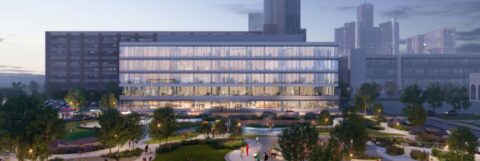Photo Credit: Michigan Chronicle
Michigan Chronicle
Dec. 17, 2024
Ebony JJ Curry
Detroit’s story is one of resilience and rebirth. For decades, the city has been a blueprint of Black brilliance and entrepreneurial excellence. At the center of that grit now stands a vision for the future, one that fuses innovation, health, and community development. The 14-acre Gratiot Site, announced today by Bedrock, will soon become the newest chapter in Detroit’s narrative. It will serve as a hub for precision medicine, life sciences, education, and opportunity. The site was once a failed criminal justice complex that cast a shadow over downtown’s skyline. Now, Detroit stands ready to reclaim the space and transform it into a center for progress.
For many Detroiters, the site’s transformation represents more than buildings or investments. It reflects an intentional focus on creating opportunities that connect Detroit’s people to pathways for success. Dan Gilbert’s Bedrock leads this effort, ushering in a new phase of growth. Their focus on innovation, collaboration, and community impact aligns with Detroit’s ongoing renaissance.
“Having access to top educational institutions, a diverse talent pool, and fostering cross-industry collaboration in close proximity to major markets has made this visionary project possible,” said Kofi Bonner, Bedrock’s CEO. He emphasized that the project will expand Detroit’s knowledge economy while ensuring expertise grows within the city. Bonner’s comments point to a vision where Detroiters thrive in an ecosystem of life sciences, education, and entrepreneurship.
A 220,000-square-foot Life Science Innovation Building will stand at the core of the project. This first-of-its-kind research and treatment facility will be powered by BAMF Health. Anthony Chang, PhD, Founder and CEO of BAMF Health, described how the site will bring life-saving advancements directly to Detroit. “From the very beginning, we were determined to deliver BAMF’s advanced, life-saving technology to the people of Detroit and southeast Michigan, and soon that vision will come to life,” Chang said. The facility will provide advanced healthcare solutions and address inequities in medical treatment.
BAMF Health will occupy 45,000 square feet of the Life Science Innovation Building. It will operate a radiopharmacy, molecular imaging clinic, and molecular therapy clinic. Precision medicine technology will allow BAMF to detect and treat cancers and other diseases while conducting clinical trials for advanced radiopharmaceuticals. For Detroit’s Black community, often impacted by health disparities, this project delivers significant progress.
Ferris State University will expand into Detroit through the project, providing training opportunities in precision medicine and STEM pathways for K-12 students. By collaborating with BAMF Health, Ferris State will position itself as a key player in developing talent within the region. This partnership supports the next generation of Detroit’s scientists, medical professionals, and innovators.
Wayne State University and its TechTown entrepreneurship hub will also contribute to the project’s success. Wayne State has long been a cornerstone of Detroit’s workforce pipeline. TechTown’s experience incubating and scaling small businesses will complement the Gratiot Site’s focus on innovation. Programs will attract startups, develop talent, and create high-paying job opportunities for Detroiters in life sciences and technology.
Michigan Innovation Headquarters (MI-HQ) will operate nearly 150,000 square feet of lab space, infrastructure, and business support services. Their “start-up factory” model will help scale life science and tech businesses while introducing early-stage bio-venture investments. MI-HQ’s role highlights the project’s mission of creating an ecosystem where businesses can grow and access the resources needed to succeed.
The Gratiot Site holds historical significance for Detroit’s Black Bottom neighborhood. Once a thriving center for Black business, the area’s entrepreneurial spirit will find new life through this redevelopment. A strategic land swap between Bedrock and Wayne County allowed this transformation to take place. For years, the site sat dormant after the stalled jail complex project. The Gratiot Site’s redevelopment is a necessary step toward honoring the area’s legacy.
“Dan Gilbert always envisioned the Gratiot Site as the gateway to downtown Detroit,” Bonner said. “He understood that the site required a forward-thinking development, one that accommodated the community, fostered innovation, and attracted talent.” His comments speak to the project’s symbolic and practical importance for the city.
Detroit Mayor Mike Duggan reinforced the project’s significance for the city’s growth as an innovation hub. “Bedrock’s plans for the Gratiot Site, along with its partnership with BAMF Health, will help to strengthen Detroit’s position as a leader in innovation, especially in the areas of high-tech medical research and world-class health care,” Duggan said. He added that the development would serve as a vital new gateway into downtown Detroit.
For Detroit’s Black community, this project brings the possibility of access, education, and opportunity. Historically, urban developments in major cities have displaced Black neighborhoods and communities. This time, Detroiters are positioned as central stakeholders. Bedrock’s partnerships with educational institutions and community anchors like Wayne State and TechTown demonstrate a focus on inclusivity and long-term sustainability.
Construction at the Gratiot Site will begin in 2025, starting with the Life Science Innovation Building. Future plans include a central park feature—a public space that will encourage walkability and create a more connected community environment. For neighborhoods like Paradise Valley, Eastern Market, and Brush Park, the development will complement ongoing revitalization efforts.
Bedrock’s vision for the Gratiot Site responds directly to what Detroiters have asked for: jobs, education, innovation, and opportunity. It positions Detroit at the forefront of life sciences, healthcare, and entrepreneurship, strengthening its role as a city of growth and progress.
The Gratiot Site’s redevelopment will impact Detroit for generations. It is an opportunity to build pathways for success, healing, and economic advancement. The project’s success will depend on Detroiters seeing themselves as leaders in its future. This is not just about new buildings. It is about creating an environment where Black innovation, talent, and resilience can thrive. Once a stalled project, the Gratiot Site will now serve as a foundation for Detroit’s next era of growth—one that uplifts its people and honors its history.

